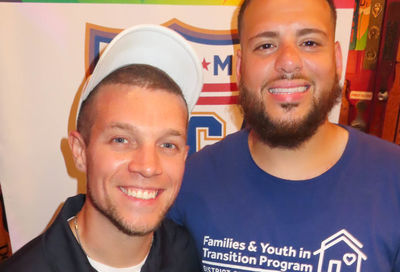Ohio Governor Vetoes Ban on Gender-Affirming Care for Minors
Mike DeWine rejected a law prohibiting minors from accessing gender-affirming care and banning trans athletes from women's sports.

Ohio Gov. Mike DeWine (R) has vetoed a measure that sought to block transgender-identifying minors from accessing gender-affirming care and would also have banned transgender athletes from competing on female-designated sports teams.
DeWine’s veto breaks a trend of Republican governors in states with legislatures dominated by Republicans signing restrictions on transgender rights into law. In total, 22 states have prevented minors from accessing gender-affirming treatments like hormones or puberty blockers, while 24 have banned transgender women and girls from competing on female sports teams.
In a news conference on Dec. 29, DeWine said he had listened to both supporters and detractors of the proposed law who “truly believe their position best protects children,” according to The Associated Press.
“This bill would impact a very small number of Ohio’s children,” DeWine said in announcing his veto. “But for those children who face gender dysphoria, the consequences of this bill could not be more profound.”
He added, “Ultimately I believe this is about protecting human life. Many parents have told me that their child would not have survived — would be dead today — if they had not received the treatment they received from one of Ohio’s children’s hospitals.
“Now, while there are rare times in the law in other circumstances where the state overrules the medical decisions made by the parents, I can think of no examples where this is done where it is not only against the decision of the parent, but also against the medical judgment of the treating physician and against the judgment of the treating team of medical experts.
“Therefore, I cannot sign this bill as it currently written.”
But DeWine also said there were administrative actions that could address some of the main concerns of proponents of the bill — namely, that minors are being “medicalized” and rushed into pursuing gender-affirming treatments before they are certain of their identities, and without understanding the long-term consequences of their actions.
As a result, he has directed state agencies to ban surgical interventions on those under 18 who seek out gender-affirming care. He noted that there is often a fallacy — on the part of anti-LGBTQ opponents and even some LGBTQ advocates — to assume that merely identifying as transgender requires a person to undergo surgery. In fact, many transgender individuals, even as adults, never pursue gender confirmation surgery.
DeWine has also directed state agencies to gather and report on data regarding those who seek out gender-affirming care, expressing concern over what he feels is a lack of data on the effects of gender-affirming treatments, both for adults and minors.
He said his administration will draft rules and restrictions to prevent “pop-up clinics or fly-by-night operations” offering gender-affirming treatments. By doing so, DeWine believes that families will be able to receive “adequate counseling” and be given sufficient time to consider their options before embarking on various treatments ranging from puberty blockers to hormone replacement therapy.
Had DeWine signed the legislation into law, a “grandfather clause” would have allowed any minor who had already begun treatment to continue receiving it. But opponents of the law had lobbied DeWine, arguing that the ban would negatively impact youth who had not yet begun medical interventions.
Hundreds of opponents testified against the bill when it was being considered by the legislature. When it was considered by the Senate, 87 witnesses offered testimony, the majority of whom opposed the bill. Additionally, many of the witnesses in support had flown in from out of state to testify in its favor, according to the AP.
The sponsor of the measure, State Rep. Gary Click, has claimed that it is an attempt to force medical providers to abide by ethical guidelines when treating people with gender dysphoria, and to ensure that transgender-identifying children do not later come to regret pursuing a gender transition.
While Click, a pastor at the Fremont Baptist Temple, has denied that his bill is motivated by his personal religious beliefs or anti-LGBTQ animus, a sermon he gave four years ago, which came to light in June, appears to undercut those claims.
In that sermon, Click asserted that homosexuality and transgender identity are contrary to God’s plans for humankind, claimed that same-sex marriage leads to the “crumbling” of society, and purported that efforts to change a person’s LGBTQ identity can be successful.
Click intends to urge his fellow Republicans to override DeWine’s veto. While Republicans have the numbers to override a veto if they all vote in lockstep, it is unclear whether they will do so — or whether DeWine, as a fellow Republican, can give some members the political cover necessary to vote against the override.
“This is not like some partisan issue here. This is an issue that transcends politics,” Ohio resident Rick Colby, a Republican and father of a transgender adult son told The Washington Post. “Get all the right people together, parents and even supporters of the bill, get them all together. Then have public meetings.”
Another Ohio resident opposing the bill, Kelli Marie, who has a transgender daughter, met with DeWine this week. She praised the governor for inviting her family to visit him at his home in Cedarville and hear their concerns about the proposed law.
“Allison shared her story as she always does — from the heart,” Marie wrote in a Facebook post. “Not hesitating to share the darkest times. Mike and I spoke about our fears, our lack of understanding, and of the process of coming to understand that this was Allison’s truth.”
The LGBTQ media advocacy group GLAAD praised DeWine’s actions.
“The governor’s veto shows he listened to families, providers and all Ohioans who know this bill is harmful and baseless,” Sarah Kate Ellis, president and CEO of GLAAD, said in a statement.
“Transgender people, like all of us, deserve to live free from discrimination, in dignity and happiness. Trans youth deserve to grow up in a state that sees, hears, and supports them. This veto is a small measure of understanding that facts matter, that all families are valued, and that Ohio is a place where common sense and compassion should always win.”
Support Metro Weekly’s Journalism
These are challenging times for news organizations. And yet it’s crucial we stay active and provide vital resources and information to both our local readers and the world. So won’t you please take a moment and consider supporting Metro Weekly with a membership? For as little as $5 a month, you can help ensure Metro Weekly magazine and MetroWeekly.com remain free, viable resources as we provide the best, most diverse, culturally-resonant LGBTQ coverage in both the D.C. region and around the world. Memberships come with exclusive perks and discounts, your own personal digital delivery of each week’s magazine (and an archive), access to our Member's Lounge when it launches this fall, and exclusive members-only items like Metro Weekly Membership Mugs and Tote Bags! Check out all our membership levels here and please join us today!



























You must be logged in to post a comment.